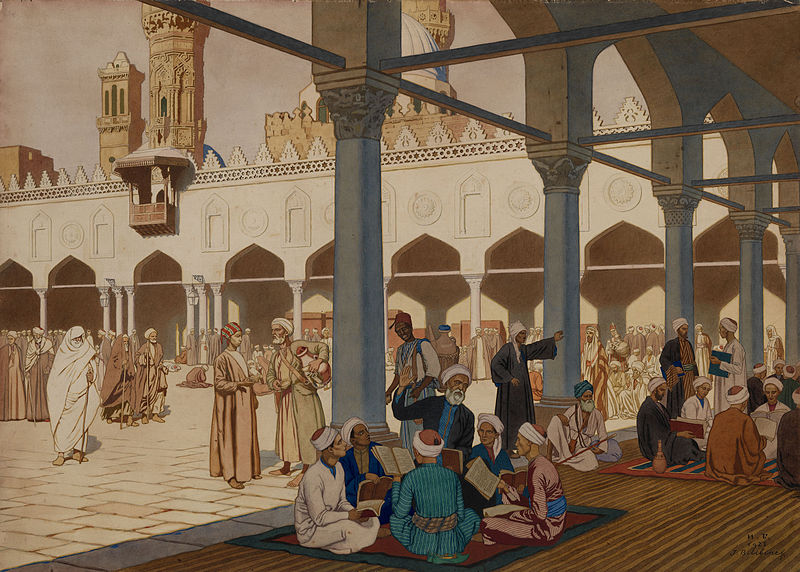I sat with my children looking at the Islamic Studies curriculum for their ages. My children browsed through the textbooks and commented, “We already studied all this year. We want to learn something new.” I agreed with them. I had the same experience when I was their age. I found the Islamic Studies curriculum going around in circles, teaching the exact same topics: Imaan, Salah, Zakah, Sawm, Wudu, Seerah, Tajweed, every single year for almost a decade.
After a while, it grew tedious and boring for me as a student. I found myself looking for new sources of knowledge of Islam and eventually found it outside the curriculum. So for my own children, I decided to do the same. I put aside the national curriculum and decided to formulate my own based on their interests.
Over the next two years in Islamic Studies, we studied; a brief history of the Muslim world, the Muslim Golden Ages, comparative religion, refutations of Atheism, purification of the soul, the wisdom behind the various acts of worship, Islamic manners and character, Tafseer of various Surahs, and explanation of several hadiths.
It is safe to say that my children, despite being only 10 and 11 years old, each of them have a much deeper understanding of Islam than the average child their age. But this got me wondering? Why isn’t all of the above taught adequately in most Islamic schools and madrassas? Why instead do we go around in circles teaching the same subjects every year?
A Proposed New Curriculum
This is my proposal for a revamped Islamic Studies Curriculum for children and what it should include. I have categorized it according to age group, rather than grades.
Ages 5-7:
1) Basic Aqeedah
2) Memorization of Surahs & Duas
3) How to pray and do wudu
4) 5 Pillars of Islam
5) Basic Tajweed
6) Islamic character and manners
Ages 8-10:
1) Basic Fiqh
2) Core Islamic beliefs
3) Introduction to other world religions
4) Tafseer of short Surahs
5) Explanation of important Hadiths
6) Seerah of the Prophet (peace be upon him) and other prophets
Ages 11-13:
1) Puberty, sex, being responsible for one’s actions and related topics
2) Detailed History of Islam
3) Muslim Golden Ages: Scientific Accomplishments
4) Purification of the soul
5) The wisdom behind various acts of worship
6) Deeper Tafseer and explanation of Hadith
Ages 14-16:
1) Fiqh of Marriage, Sexual Relations, and Parenting
2) Fiqh of Business, and Islamic work ethic
3) Introduction to Usool of Fiqh, Tafseer, and Hadith
4) Contemporary Issues related to Islam and the modern world (Atheism, Feminism, Liberalism)
5) How to deal with temptation and the traps of Shaytaan
6) Studies of the biographies of contemporary Muslim heroes
Scholars need to work on this
The above are just suggestions. I’m sure the scholars of our time can look at this list, get some ideas, and refine the list into actual subjects, textbooks, etc. The point I am trying to make is that we cannot rely on an Islamic Studies curriculum developed ages ago in the modern.
We need to be constantly updated the curriculum according to challenges of the time we are living in. I believe that if scholars work together, we can come up with much more comprehensive Islamic Studies curriculums that will have a far deeper impact on the hearts and minds of our students.
Learn more about the Islamic Golden Age by clicking here.



Do you have a recommended list of books for each of the topic you mentioned?
Not for all. Some topics I made my own notes, some I used books, and some were just verbal discussions which is my primary method of teaching my children.
Some of the books I used are:
1) Al-Ghazali Kid Series for purification of the soul and wisdom behind acts of worship
2) 1001 inventions for Islamic Golden Age
3) In the Prophet’s Garden for hadith
For Tafseer, for example, I would just read from the Quran, translate and explain to them in my own words and discuss with them. Likewise, for comparative religion and Atheism, they ask questions and I taught based on their questions. So no books were used for those subjects. Although I did formulate some notes for Tafseer.
What books in english do you suggest for each topic you enlisted?
Some of the books I used are:
1) Al-Ghazali Kid Series for purification of the soul and wisdom behind acts of worship
2) 1001 inventions for Islamic Golden Age
3) In the Prophet’s Garden for hadith
I didn’t use books for all topics since books at kids level aren’t available on most of these topics yet.